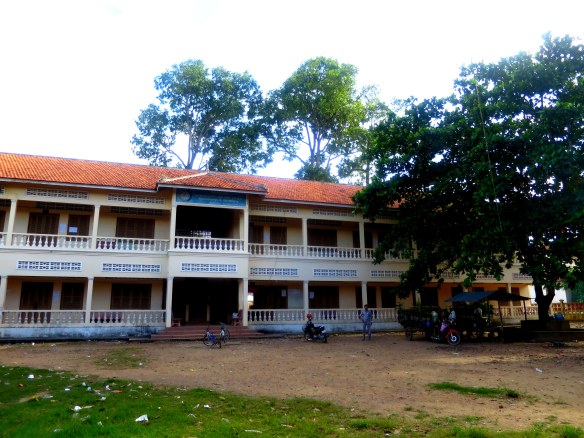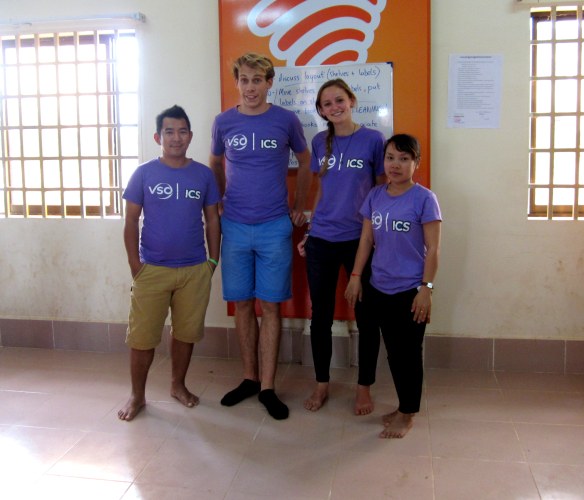We were the first ICS Entrepreneur volunteers to arrive at Kratie, a rural province in North-east Cambodia. Kratie town itself is located right on the Mekong river with incredible views at sunset. It’s a mellow town, with traditional Khmer houses lining the streets.
There’s a local buzzing market and an abundance of entrepreneurs who have set up their own roadside businesses selling sugar cane, fried banana and other rice or bean-based snacks. All of our host families run their own micro-enterprises – some are tailors, some are farmers and one sells fruit at the central market. Almost everyone in Kratie is entrepreneurial in their own way.
Our partner organisation, Cambodia Rural Development Team (CRDT) is a local NGO founded in 2001 with the overall aim of creating a country free from poverty and environmental degradation.
As with many other small NGOs, there are concerns over the sustainability of funding. Most donors give restricted funding, which stipulates exactly when and where the money can be spent. This means that other important things such as staff development and welfare can be overlooked. So, Mao Savin, one of the founding members of CRDT, and Geordie Smith, a volunteer teacher, had the idea of starting a social enterprise called Conversations with Foreigners (CWF) in Phnom Penh back in 2005. 60% of CWF profit would go to funding CRDT’s livelihoods programme, which now delivers community and rural development projects to 4,961 families.
CWF isn’t your typical English school; it’s based around conversation and culture-sharing rather than classroom based grammar / vocabulary learning. Our project was to conduct a feasibility report investigating whether establishing another CWF school in Kratie could make profit for CRDT, as well as benefit the community here.
We started by splitting the feasibility report into sections, exactly how you would write a business plan. We wanted to outline and make recommendations about the current market, the location of the school, teacher recruitment, budget forecasts, structure / staffing and start-up strategies.
Some working days were more structured than others; we obtained statistics from the Department of Education and the Department of Planning to establish the numbers in our target market, carried out market research at three educational institutions and arranged Skype calls with CWF Phnom Penh. Other days were less methodical; we cycled round Kratie to find buildings for rent and had conversations with local people about CWF. One of the teachers at Kratie Krong high school told us “the school sounds great. It would be unique, and different from other schools in Kratie.”
With the invaluable support of Dan, the accountant on our team, we put together a detailed budget forecast and break-even analysis. We even travelled to Phnom Penh to meet Savin, founding member of CRDT and CWF, to get his useful advice on our work.
It’s been a rollercoaster ride, and I think above all, we learned the importance of synergy. We didn’t go in and impose opinions or solutions, we worked together with people to achieve positive results. There is no way we could have done it without the expertise and knowledge of our counterparts, Santana and Sreymom. The whole is truly greater than the sum of its parts.
Our feasibility report establishes that there are roughly 10,000 students between the ages of 13-25, but currently no English school taught solely by a native-speaker. 100% of students we surveyed told us they would like to learn from a foreigner, because they “speak English correctly, fluently.” Our report concludes that CWF Kratie is a feasible business opportunity, with a potential profit of $3,000 in its first year.
A definite decision has now been made by CRDT to start CWF in March / April next year. It’s amazing to think that one day we may return and find an English school that we helped create. We’ve hopefully helped CRDT become as self-sufficient as possible too.
CWF will have a sustainable impact on people’s lives here. The desire to learn English, particularly from foreigners, is unbelievably strong. The lack of knowledge is proving to be an obstacle on both an individual and national level. Quite simply, it improves job prospects. Sreymom studies English morning and night. She says “with English I can easily find a job. I want to be a boss one day… so I need to be able to communicate in an international language.”
We feel confident that we have laid strong foundations for work that will reach far beyond our eleven week placement. And that’s what ICSE is all about, being part of long-term change.








